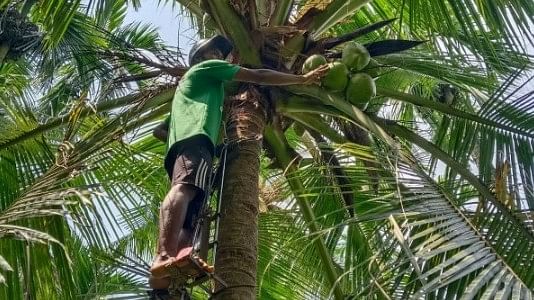
Team members from the Pingara FPO harvest coconut and areca.
Credit: Special arrangement
In the verdant fields of coconut and arecanut plantations, where lush greenery meets the azure sky, a silent crisis looms large — the shortage of labourers. This scarcity has cast a shadow over the traditional harvesting practices of these vital crops. However, technological interventions are revolutionising coconut and arecanut harvesting in the coastal region of Karnataka.
Traditionally, coconuts and areca are harvested manually by skilled labourers, who climb the trees with their feet locked firmly to a traditional device made of coir. In the past, due to the lack of climbers, many coconuts would dry up on the trees and fall, resulting in wastage or pilferage. However, the situation has now changed.
In 2020, the Tyagali Seva Sahakari Sangha from Nanikatta in Uttara Kannada decided to train labourers using 'doti’, a carbon fibre telescopic spraying and harvesting device. The sangha pioneered the use of the device, and now has 11 doti with 22 skilled workers who operate them.
“The response has been really good. From a handful of farmers using the service in the beginning, we are covering nearly 500 to 600 acres now in Sirsi, Yellapur, Siddapura and Kotemane areas. The farmers book their slot, and our team reaches the farm at 7.30 am,” says Tyagali Sangha President N B Hegde. Depending on the skill and efficiency of the labourers, they earn somewhere between Rs 2.5 lakh to Rs 3 lakh during the season of harvesting and preventive spraying for areca, he adds.
“We have trained several youth in the coastal belt in using doti for harvesting and spraying. We want cooperative societies to take up the initiative so that farmers are benefited,” he says. This prevents farmers from selling off their arecanut farms due to a shortage of labourers, he explains.
The society is also considering providing services for all processes associated with areca from spraying till the final product is ready for sale. “We have purchased a one-acre-eight-gunta land near Nanikatta where areca will be processed after harvesting,” says Hegde.
Coconut tree climbers
Climbing coconut trees to harvest coconuts is a challenging and inherently risky endeavour too. In response to the shortage of coconut tree climbers, six months ago, ‘Hello Nariyal’, a concept initiated in Kerala, expanded its operations into Dakshina Kannada through Dharithri Souharda Sahakari Niyamita, a cooperative society based in Mura near Puttur under the presidentship of Vasantha Gowda.
Ramesh, who handles slot bookings and operations for the cooperative, explains, “Once a slot is booked over the phone, and climbers are assigned, the farm owner shares the location with the team.” The team arrives in cycles to harvest coconuts. “Currently, we have six climbers in the society, and we receive enough bookings for all the weeks in a month during the harvest season,” Ramesh adds. For larger farms, climbers may stay on site until the work is completed before returning.
The team covers up to 15 km in a cycle and charges Rs 50 per tree. Depending on the tree, a climber can harvest coconuts from at least 50 trees per day.
The society has also invested in dotis and has four teams comprising eight labourers.
Ramprasad from Uppinangady, who availed the service of ‘Hello Nariyal’ and doti teams from Dharithri says, "The service helped me a lot at a time when there was a shortage of workers. As the team is well-trained, they are cautious while harvesting and ensure there is no damage to the hingara (areca inflorescence)." If more cooperative societies take up such services, it will benefit farmers from the entire district, he adds.
Growing efforts
Pingara Horticulture Farmers’ Producer Company Limited, a farmer producer organisation (FPO), was inspired by the doti training workshops organised by Tyagali Society. It started with three dotis and seven staff in February 2022. Now, Pingara’s skilled worker strength has grown to 60, with six managers overseeing 30 dotis.
The CEO, Pradeep, explains, “A team consists of eight workers and a manager who supervises and calculates the bunches of harvested arecanuts and issues bills to the farmer.” In the fiscal year 2023-24, the teams harvested and conducted preventive sprays in 350 arecanut plantations, generating a business turnover of Rs 1.6 crore.
On the use of the doti, Pradeep adds that it helps harvest whole bunches and prevent the scattering of arecanuts. After harvesting, the bunches are arranged for the farmers to collect for further processing. With the spraying device, wastage is significantly reduced as well. “We are able to complete the entire harvesting process in a day, regardless of the plantation's size by deploying more teams,” he adds.
However, it is crucial to ensure that the dotis do not come into contact with electricity lines, so they work with caution.
The demand for workers remains high. “In fact, we are encouraging other FPOs and cooperative societies to take up similar initiatives by training locals. The Parivaara Panja Farmer Producer Company Ltd in Panja recently conducted a trial harvesting of arecanuts using two dotis,” Pradeep adds.
Yatheesh from South Canara Coconut Farmers' Producer Company Limited in Puttur says “Our FPO in Puttur has registered around 600 coconut climbers. When we get calls from people seeking climbers to harvest coconuts, we link them to the climbers who are available in the area.”